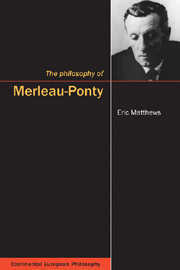1 - Merleau-Ponty in Context
Summary
Why should we still read Merleau-Ponty? He died, after all, in 1961, at a time when the social and cultural situation and the preoccupations of philosophers were very different from those of the end of the twentieth century and the beginning of a new millennium. Is he not simply a representative of a now outmoded “humanism”, a philosophy of the “subject” and of the phenomenology of consciousness? That he was a humanist in some sense of that rather vague word is undeniable; he was certainly concerned to affirm human values and believed that there are such values to affirm. But he was not, as I shall try to show in the course of the book, a “humanist” in the sense in which that term is often used pejoratively by some of his “posthumanist” successors, such as Foucault and Althusser. That is, although he stressed the importance of the subject, he was not a defender of the Enlightenment conception of a human subjectivity that is independent of the physical, social and historical situation of the human being concerned. “Humanism” in this sense is sometimes associated by its critics with phenomenology and, clearly, Merleau-Ponty was a phenomenologist. But his “existential” interpretation of what that means, as again I shall try to show, was far from identifying it with a philosophy of the transcendental subject and a description of that subject's inner consciousness.
- Type
- Chapter
- Information
- The Philosophy of Merleau-Ponty , pp. 1 - 22Publisher: Acumen PublishingPrint publication year: 2002

